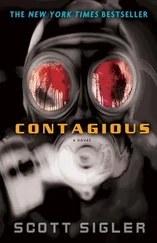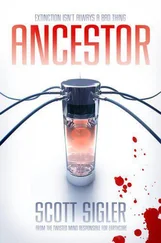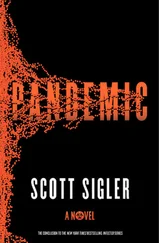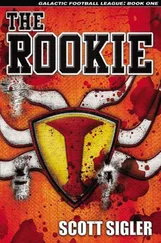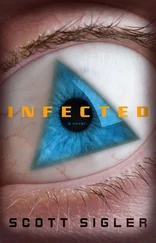“Doctor Metz! How are you this morning?”
Metz stopped to look at her. He gave his trademark single slow nod. “Good morning, Robin.”
“Did you go out on a pickup?” When she’d started working here seven years ago, Metz had gone out on pickups three or four times a week, whenever there was a really bad killing or something unusual about a body, something interesting. As the years had passed, she’d watched him go out less and less. These days, he rarely left the office at all. He still ran the department, though, expecting his people to display the same dedication and perfection that he had shown for almost four decades.
“I did,” he said. “I’ll do the x-rays myself, right now, then I’ll be in the private exam room for the next few hours. I don’t want to be interrupted. Would you mind handling the department?”
“Sure, no problem.” Robin tried to keep her voice neutral, but she couldn’t help but feel a little excited by the request — yet another sign that he was grooming her to replace him. She had a lot of work ahead of her and a long way to go to qualify in his eyes, but everyone knew the chief medical examiner job was hers to lose. “Happy to do it,” she said.
“Thank you. And I will want to use that RapScan machine. You received the training on it, yes?”
She nodded. The rapid DNA tester was a potential sea change in law enforcement. DNA samples were usually taken at the morgue, then shipped off to labs for processing. Depending on the test, it could take weeks to get results — sometimes even as long as two months. The new portable machines, however, could be taken right to the body and provide a reliable DNA fingerprint in a matter of hours. Rapid Analysis, the RapScan 2000’s manufacturer, had given San Francisco a model because of Dr. Metz’s nationwide reputation in forensics.
Metz had asked Robin to master the device. For all the RapScan 2000 could do, the size still amazed her — it was no bigger than a typical leather briefcase. Labeling and data entry were done on a built-in touch screen. That same screen displayed results. Sample cartridges were the size of a matchbook, and the machine could process up to four samples simultaneously.
“It’s easy,” she said. “You could have taken it with you into the field, you know. It’s small enough to fit right in the back of the van. That’s the point of it, Doc — if you’d started the process while you were in the field, it would probably be kicking out the results right now.”
He thought about that, then gave his single slow nod. “That would have been helpful. Call the Rapid Analysis company and tell them I want a second test unit. But do that after you show me how to operate it.”
“Sure thing, Doctor Metz.”
Why was he in such a hurry? She peeked past Metz to the body on the cart. The white body bag hid any details of the corpse, although the form inside it did look a little misshapen. She detected a whiff of urine. Not unusual for a body to void itself upon death, but it had to be pretty saturated for her to smell it through the thick material. She tilted her head toward the bagged corpse. “Something interesting in there?”
Metz looked at her for a few moments, as if he was thinking of saying something but then decided against it. He spoke a fraction of a second before the stare would have become uncomfortable.
“Maybe,” he said. “We shall see. A case like this … it’s delicate. Maybe I’ll tell you about it. Maybe soon.”
“When you do, boss man, I’m all ears.”
“Oh, I saw your boyfriend while I was out. How is Bryan these days?”
Robin’s smile faded. “Bryan and I broke up.”
Metz’s eyes saddened. “Recently?”
“About six months ago.”
He looked at her, then looked away. This time it was uncomfortable. “Yes. You’ve told me about this before. Now I remember.”
Not knowing what else to do, Robin just nodded. Metz rolled the body into the morgue one slow step at a time. Even at his age, he liked to handle everything himself.
It was hard to watch him forget things. Had to be murder for him — a man whose life and identity rested squarely on his intelligence — to see the first signs of his memory slipping away.
Robin walked through the receiving area where bodies were declothed, weighed and photographed. She entered the offices, which consisted of a dozen gray cubicles that made the old yellow carpet look brighter by contrast. Printouts and paper clippings were tacked up to the cubicles’ fabric, showing news coverage of various murders or high-profile suicides. Any photo that showed someone from the examiner’s office in action immediately went up as a trophy.
She put her helmet and jacket in her cubicle, then retied her long ponytail as she looked at the chalkboard. That was how the San Francisco ME Office tracked incoming bodies and assignments — not on computers, but on a three-foot-wide, six-foot-high green chalkboard. The board was divided into three-by-three sections that slid up or down, one under the other. The top board listed last night’s work; ten names scrawled in chalk, all reading the time of arrival, the examiner assigned to the body, and “NC” for natural causes .
The board on the bottom was today’s work, already four lines deep. Two of those listed NC , while the other two listed a question mark — a question mark meant a probable homicide.
She saw the line on the bottom with Metz’s name in the “assigned” column. The stiff’s name was Paul Maloney .
Robin let out a long, slow whistle. Father Paul Maloney. That was high-profile. Was that why Metz had gone on the pickup? That made sense. And yet, she felt like he’d wanted to tell her something else, something he’d ultimately decided she wasn’t ready for yet. What that might be, she didn’t know.
Whatever it was, it would have to wait, because according to the board Singleton, John, NC and Quarry, Michelle, ? were waiting for her.
Pookie’s Sister
Pookie parked the Buick on Union Street, next to Washington Square Park. As he got out, his hands did their automatic four-pat — a pat on the left pants pocket for his car keys, the right pants pocket for his cell, left breast for his gun, and rear-right pants pocket for his wallet. Everything was in its place.
Bryan was leaning on the Buick’s hood, left hand pressed against the chipped brown paint.
“Bri-Bri, you okay?”
Bryan shrugged. “Might be coming down with something.”
That would be the day. “Dude, you never get sick.”
Bryan looked up. Beneath his shaggy, dark-red hair, his face looked a bit pale. “You don’t feel anything, Pooks?”
“Other than guilt at hogging most of the universe’s available supply of awesome, no. I’m fine. You think you caught something at the Maloney site?”
“Maybe,” Bryan said.
Even if Bryan had caught something, they’d been there only a few hours ago. Flu didn’t set in that fast. Maybe Bryan was just tired. Most days, the guy hid in his darkened apartment like some nocturnal creature. Three day shifts in a row had probably played havoc with Bryan’s sleep patterns.
They walked down Union toward the corner of Mason Street. There lay the Trattoria Contadina restaurant. According to Tryon’s info, one Pete “the Fucking Jew” Goldblum had been seen there several times.
“Bri-Bri, know what’s bugging me?”
“That Polyester Rich has our case?”
“You’re psychic,” Pookie said. “You should be one of those fortune-tellers.”
“Just leave it alone.”
Like hell Pookie would leave it alone. Why would the chief want her best two inspectors off the Maloney case? It just didn’t make any sense. Maybe it had something to do with whatever was under that blue tarp.
Читать дальше



